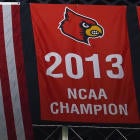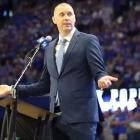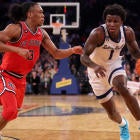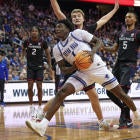The NCAA's decision to take away Louisville's 2012-13 national championship in men's basketball was an unprecedented call for the sport.
But it's not the only instance in which a recognized national champion in a sanctioned NCAA sport went on to have its title stricken from the record. In fact, 20 prior national champions in Divisions I, II and III have retroactively had their titles taken away after the NCAA deemed improper benefits or other violations took place that warranted pulling down banners and taking back trophies.
Louisville is destined to be infamous -- the most well-known school to lose a national title -- but it's only the latest in a line of annulments by the NCAA and its Committee on Infractions.
All schools were provided by the NCAA upon request from CBS Sports. The years in parentheses are when the programs won their titles, not when those titles were taken away. This list does not include USC losing its 2004 BCS title because that championship was taken back by the Bowl Championship Series, not the NCAA, which has no control over college football's Division I bowl system.
Division I
Howard men's soccer (1971). The first instance of the NCAA taking away a title in the modern era. In 1997, Grant Wahl chronicled at Sports Illustrated the reasons behind the title vacation of the first Division I championship by any HBCU in history. The issue came down to the supposedly ineligible players.
San Francisco men's soccer (1978). According to report from the UPI wire service in 1980, "Father John LoSchiavo, president of USF, said the action was taken because a former student-athlete who played on the team had submitted an altered transcript at the time of his application for enrollment."
UTEP men's cross country (1983). Runner's World has the interesting backstory on what led to the NCAA taking action.
Tulsa women's golf (1988). Get a load of this, from The Oklahoman, in 1992:
University of Tulsa officials and athletes expressed shock and dismay Tuesday over an unprecedented decision by the NCAA to place the entire Hurricane athletic program on three years probation for violations in the school's track and field team.
"I am so angry at the NCAA," said Lisa Del Prete, a senior on TU's nationally ranked women's golf team. "I just want to take them by the necks and shake them up and down. " The NCAA's official release said the violations occurred in the track and field program for three years, starting during the 1987-88 school year. Among its findings, the NCAA said it discovered several major violations, including lack of institutional control. The report said the track coaches encouraged athletes to compete under assumed names, allowed ineligible athletes to compete and the falsified the participation lists.
In announcing its decision after a two-year investigation, the NCAA said Tulsa would have to forfeit its 1988 NCAA women's golf title, and that none of the Hurricane teams would be allowed to compete in post-season competition for one season.
Syracuse men's lacrosse (1990). Think about UCLA's best championships under Wooden, or Indiana going undefeated under Bob Knight in 1975-76, or that dominant 1995-96 Kentucky team. Those are the equivalent to the Cuse men's lax team of 1990, which lost its title because the head coach's wife co-signed for a car loan for Syracuse player. An hour-long documentary was made about the team.
Arkansas men's outdoor track and field (1994 and 95). The AP's report from 2007 quotes former COI chair Josephine Potuto describing the case thusly: "The violations involved unethical conduct by the former assistant coach, as well as an admitted failure to monitor by the university. The underlying violations were not egregious in and of themselves, but in combination they formed a major case."
UCLA women's softball (1995). A 1997 UCLA's news bulletin starts: "The NCAA announced Tuesday a decision by its Committee on Infractions to penalize UCLA for overawarding financial aid in softball."
Hawaii men's volleyball (2002). "The report showed that one of the team's foreign-born players, four-time first team All-American Costas Theocharidis, had played on a professional team before competing for the Warriors. On Sept. 5, the NCAA stripped the Warriors of their title," according to a wire story from 2003.
Lewis University men's volleyball (2003). The rare self-imposed title vacation here, as Lewis University beat the NCAA to the decision after discovering it had multiple players in multiple years ineligible for competition.
Florida State outdoor men's track and field (2007). North Carolina didn't lose a national championship over academic impropriety, but Florida State's track and field program was not as lucky.
LSU women's outdoor track and field (2012). Directly from the university: "The LSU Women's Track and Field team will be required to vacate its 2012 NCAA Outdoor team championship due to a student-athlete's use of a stimulant banned by the NCAA that is commonly found in over-the-counter nutritional supplements."
Louisville men's basketball (2013). Over the course of nearly four years, former Louisville director of basketball operations Andre McGee discretely and sporadically organizes parties for Louisville players and recruits. The parties involved women paid to strip and asked to have sex with U of L players and recruits. Players involved in the probe are retroactively deemed ineligible, with Louisville being forced to vacate all of its records and 123 victories from 2011 to 2015.
Division II
Cal Poly baseball (1989). According to the NCAA, multiple years worth of postseason appearances have been stricken from the record, including Cal Poly's D-II College World Series title.
Mississippi College football (1989). Punished after the NCAA ruled that the program grossly exceeded its scholarship limit.
Lynn University softball (2005). "Former coach Thomas Macera gave two players a combined $3,188.61 to pay for tuition and books in 2005," an AP story citing the NCAA's ruling said.
Saint Augustine's men's indoor track and field (2007). Transfer and eligibility rules were broken in many sports and Saint Augustine's was forced to vacate its title.
Armstrong State women's tennis (2015 and 2016). The program no longer even exists, as Armstrong State merged with Georgia Southern.
Division III
The College of New Jersey (formerly Trenton State) women's lacrosse (1992). Details are scarce online, but even the school noted in 2005 that it de facto counts its vacated title.
Plattsburgh State men's ice hockey (1987). Via this New York Times story from 1990: "The committee found that between 1985 and 1988, several student athletes resided in the homes of representatives of the institution's athletics interests and received impermissible extra benefits from their host families. These benefits included free housing in some instances, use of automobiles, occasional meals and small cash loans."
Thomas More women's basketball (2015). Randy Moss' daughter was at the center of a case involving an impermissible benefit: that she was afforded free housing by a coach while she recovered from injury.





















